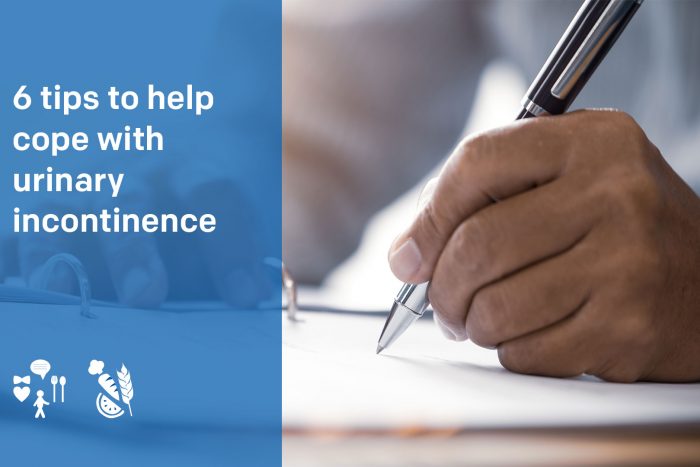You have urinary incontinence and don’t know what to do about it? First of all, you should talk to your doctor about it. It is a must. And you need to make sure you get satisfactory answers to your questions and know what you need and can do. In the article Do you have urinary symptoms and are worried? , we especially talked about the urinary symptoms that you may experience when your prostate becomes enlarged and squeezes your urethra, as well as a summary of how to treat this condition.
This article discusses more practical tips to help you manage the symptoms of urinary incontinence.
Keep a diary of your urination
Help your doctor better understand how your bladder works by keeping a diary. To be able to “re-educate” your bladder, you must take note of the time you urinate, drink or have accidental leakage of urine, etc., over a period of 3 days. And remember to bring your completed diary when you next visit the doctor. Click here for your exemplary journal
Do Kegel Exercises
These exercises strengthen the muscles of the pelvic floor that surrounds the urethra. These are the muscles that you contract to interrupt the flow of urine. By strengthening them, you can reduce incontinence. Standing, sitting or lying down, knees slightly apart, imagine that you are restraining yourself from urinating or having a bowel movement. Contract the muscles you would use in this situation for 5 to 10 seconds, then relax them for 10 seconds. This exercise is repeated 2 to 3 times a day at the rate of 10 contractions at a time, or more. See How to deal with incontinence here
Avoid caffeine
Caffeine is a well-known diuretic. It also irritates the bladder and stimulates muscle contractions, which can worsen the symptoms of emergency incontinence (overactive bladder). You then have an urgent and uncontrollable urge to urinate and you do not have time to go to the toilet. We, therefore, avoid all drinks containing caffeine and we go to decaf if you absolutely need to have your cup of coffee in the morning. They are gaining in popularity and many are excellent.
Stay hydrated
Drink at least eight glasses of water during the day to prevent conditions such as urinary tract infection, constipation, and kidney stones that cause incontinence. You should also consider drinking most of your fluids during the day and limiting the amount of fluids you drink in the evening before going to bed.
Lose weight
Being overweight can weaken the pelvic floor muscles and cause incontinence due to the pressure of your fatty tissue on your bladder. Your symptoms may improve as you lose weight. Exercising and eating a healthy diet, rich in fruits and vegetables, is a great way to regain a healthy weight for your height. See the Nutrition and Healthy Weights section of our website for a wealth of tips and advice. The conference of the popular nutritionist Isabelle Huot can also be a starting point.
Treat constipation quickly
If left untreated, constipation or, more specifically, the accumulation of stools in your gut, can put increased pressure on your bladder, increasing your urination needs or preventing your bladder from emptying completely. If you are constipated, it may be helpful to change your diet and lifestyle. Ideally, we avoid processed foods rich in sugar, salt, saturated or trans fats which are difficult to digest and eliminate, we drink a lot of water and we exercise on a regular basis.
Take the time to visit each of our pages on this website, as well as our YouTube channel, in order to get familiar with the disease with our expert lectures, our section on available resources, the support that is offered to you.
Do you have any questions or concerns? Above all, do not hesitate. Contact us at 1 855 899-2873 to discuss with a nurse specializing in uro-oncology. It’s simple and free, like all our services.
Pages of our site that might interest
you Want to know more? Just click on one of the links below.
The resources at your disposal
Am I at risk
Signs and symptoms
PROCURE news that may interest you
Each week, we publish a blog article. Here are a few for you.
5 facts to know about prostatitis
5 facts to know about large prostate (BPH)
Conference that might interest you
Written by PROCURE. © All rights reserved – 2019



 ADDITIONAL RESOURCES
ADDITIONAL RESOURCES


